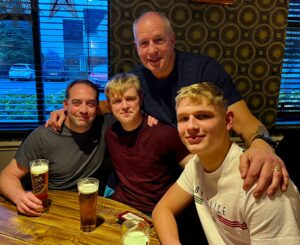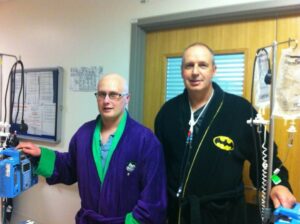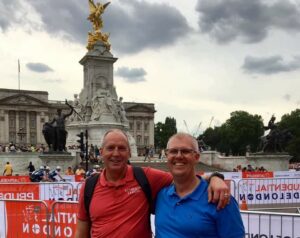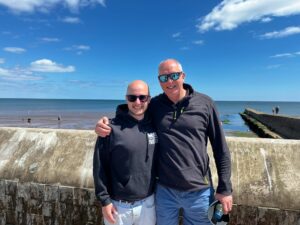
19 Aug 2024
Friends-for-life: Chris’ AML story
We all need a support network around us through the difficult times. My close friends and family were crucial with the practical and emotional aspects. But I didn’t expect my blood cancer diagnosis to lead to meeting new friends-for-life.
Chris’ symptoms began in summer of 2011. The police officer from Oxford had an irritating cough that wouldn’t go away, constant tiredness, and Chris’ leg ached so badly that there were occasions when he couldn’t walk. Chris also had night sweats and started to fall asleep nearly every afternoon on his days off work. With nothing improving by October, Chris eventually went to see his GP who offered him a blood test.
“After my GP got the results back, he told me to go immediately to A&E at the John Radcliffe Hospital in Oxford,” said 64-year-old Chris, who now lives in Dorset. “This was about 7pm and I spent a long and uncomfortable night there having tests. The next morning, I had to wait until my wife could join me to receive the results from the consultant. Ironically, she was also at the hospital but was in the Maternity Ward with her sister who was giving birth to her first child.”
On Wednesday 2 November 2011 Chris was told he had acute myeloid leukaemia (AML). He was 51 at the time. The consultant said he could go straight into hospital to start treatment or he could have the weekend at home with his family and then start treatment on Monday.
“I couldn’t believe that it could be true. I was very fit and active, and my two youngest sons were only 11 and 7. I began to panic – slowly at first but the feeling quickly grew – that I was going to leave them while they were both so young and that I would never get to see them grow up.
“I made the decision to have the weekend with my family. We took the children out and bought them new bikes and had an early Christmas together, not knowing if I would still be around in December. We told my eldest son, James, about my diagnosis. He was 21 at the time and lived with my ex-wife. We also told our 11-year-old son the truth and that I might not survive. We only told our seven-year-old son that Daddy was ill and would have to spend some time in hospital to get better.”

Chris with his sons.
Six months of chemotherapy at the Churchill Hospital in Oxford began for Chris, which turned out to be a rollercoaster.
“Each round lasted two weeks then I was allowed home, very weak and unable to eat much. I would always become ill with some sort of infection or other then, when my temperature spiked, I would have to be urgently readmitted to hospital, and spend the next couple of weeks being treated with intravenous antibiotics and having tests to discover what infection I had succumbed to.
“After that I would start to feel better. When I was almost back to pre-leukaemia fitness and health, I would briefly be allowed home again. This was always a fantastic time. But then I would have to go back to hospital again and start another cycle of the treatment process. Going back on these occasions was always very hard because I felt so fit and healthy but knew it wouldn’t last. I went through the whole thing six times.
“It was obviously very difficult for my family during my illness. My wife Amanda had to continue working, take our children to and from school, visit me in hospital, and try to keep me strong and positive. But she was so strong and constantly at my side when I needed her, as was my sister Debbie. I kept photos of my wife and sons on my wall every time I was admitted to hospital. It was my goal to get back to full fitness and to be there for them, as they were growing up.
“The other person who became so important to me was Andy, a friend I made who was on the same ward having treatment. He was half my age and had a very similar military background to me, as well as the same sense of humour. We were often in hospital at the same time and frequently shared a room. We would roam the wards at Churchill Hospital in our Batman and Joker dressing gowns. We laughed so much during that whole time together and we both think, as do our families, that our meeting played a big part in our getting through the whole thing. Fortunately, we both survived.”
Chris was treated with FLAG-Ida for his first round of chemotherapy, a drug now in standard use but being trialed at the time. It was not successful for Chris, although on the plus side he didn’t have many side effects. He was given a stronger dose for his remaining chemotherapy, but then the side effects in with rigors, sickness and hallucinations.

Chris in hospital with Andy.
“I was in hospital just before Christmas, looked out of the window and saw the Christmas tree in the courtyard had caught fire. I rushed out of the room and alerted the nurses who sprang into action and grabbed the nearest fire extinguisher – only to discover there were no flames, the tree had just blown over in the wind. Fortunately, the nurses, myself and Andy all saw the funny side and they teased me about it for some time afterwards.”
Chris was told his best chance of remaining free of leukaemia was to have a stem cell transplant.
“On 11th May 2012, three days after my 52nd birthday and on my eldest son’s birthday, I had my bone marrow transplant. Within a few days I was up and slowly moving about. I was discharged from hospital after only a couple of weeks to recover at home.”
Slowly Chris began to regain his strength. Weekly check-ups moved to monthly, then six-monthly, then annually.
Chris and Andy met up outside hospital to support each other and they still keep in touch to this day. Andy now has two children of his own. It took Chris a few years to return to full fitness and go back to his job as a police officer. He is now retired but gives one day a week as a volunteer police officer in London. Leukaemia had a substantial impact on other areas of his life as well.
“Before I was diagnosed with AML my family and I lived in a large, detached house in Oxfordshire. We had an annex in which my 79-year-old mother lived, and our children went to good schools. When I became ill, and was unable to work, I lost a large part of my salary, so we had to downsize. My children gained places at good state schools in Dorset, so we moved there in August 2012. My mother had to go into a care home as she had early signs of dementia and she sadly passed away in 2012, just as I was recovering from my transplant. I only saw her twice during my illness. The whole episode was a huge life change.”
Always curious about the person who had donated the stem cells that had given him a new life, Chris decided to write to thank his donor. The hospital said they could pass on the letter. To his delight, Chris’s donor, Thomas, who lives in Germany, wrote back to him, and the pair arranged to meet up.
“In 2019 I travelled with my family to meet Thomas in Steinfeld in Northern

Chris with his donor Thomas in London.
Germany. It was a very emotional meeting for both of us. I thought maybe we would shake hands but we both immediately hugged. Thomas had been on the register since his teens and had almost forgotten about it when they contacted him at the age of 41 and told him I was his match. He’s ten years younger than me but has two children the same age. We had a wonderful weekend with them, then they made a return visit to stay with us in the UK, and we still keep in touch. The funny thing is I now have his hairline. I’d been losing my hair even before I had chemo and thought I might be lucky and have it grow back better after! Well it did, for two months – then it fell out again! But my new hairline is exactly the same shape as his.”
Chris’ friendship with Andy also continued, and the pair achieved together what for many would be a dream – appearing as extras in a big TV series.
“During the first couple of years after leaving the police, I started my own extras agency for TV and film, called Reel Cops. My aim was to make the portrayal of police on screen more accurate and authentic. The agency was very successful over the two years it operated, providing police extras for nearly 40 productions. This included dramas on BBC, ITV and Sky, a number of low budget independent films, and one Jackie Chan Blockbuster in 2017. One series was ITV’s Law and Order UK, which was filmed in London and starred Bradley Walsh and Doc Brown. I invited Andy to work on it with me. The actors were both very funny people to work with and we had the most fantastic time which, back in our hospital days, lying in bed, wondering how we were going to survive, we could never have imagined.”
“I have been in remission for just over 12 years. Mostly, I forget that I ever had leukaemia. I have blocked out a lot of the memories of this time. It was very traumatic in parts. I would say that it took me about seven years to get back to my pre illness fitness level, but now, I am probably fitter than I have ever been. My hospital checkups are every two years. Whatever the future holds for me, I have already had an extra 12 years of life, that I may never have had. I consider myself extremely fortunate to have been given this gift and to have seen my sons grow up into lovely, caring young men, now 33, 23 and 19 years old.
“I am still good friends with Thomas. He has given me this extra life that I am enjoying. We keep in touch regularly and I will be forever grateful to Thomas, the Anthony Nolan Trust, the NHS, and my family, for giving me my life back. And to Andy who got me through it all in a way no one else will ever be able to understand. I would like to live long enough to die an old man, having seen all my sons grow up and have families of their own. I know I am already a very lucky man.”

Chris with Andy in June 2024.
Related posts
1 August 2022
Pedalling pair’s crazy peaks challenge to stop leukaemia cutting short the lives of beloved mums
Leukaemia UK supporter, Alistair, who lost is mum to leukaemia less than a year ago, is setting out on an extreme fundraising challenge. Alistair, who is from Lincoln, and his…
11 February 2021
Why I became a Leukaemia UK Trustee
Caroline Evans – Leukaemia UK Trustee and Projects Consultant – reflects on why she became a Trustee and what drives her in the role.
24 August 2022
Non-existent awareness of leukaemia symptoms “extremely worrying” – say leading UK leukaemia charities, as they launch memorable new campaign to get people “parroting on” about the symptoms
People over 55 also underestimate their risk, thinking that leukaemia is a childhood disease. Only 11% of over 55s thought that they had the greatest risk of leukaemia[1], whereas in…
17 September 2024
The food industry’s great and good come together to celebrate 25 years of Who’s Cooking Dinner? and raise over £280,000 for leukaemia research.
London’s hottest charity culinary event, Who’s Cooking Dinner?, celebrated its 25th anniversary at The Dorchester on Monday (16th September). It was an event to remember with chefs including Tom Kerridge,…